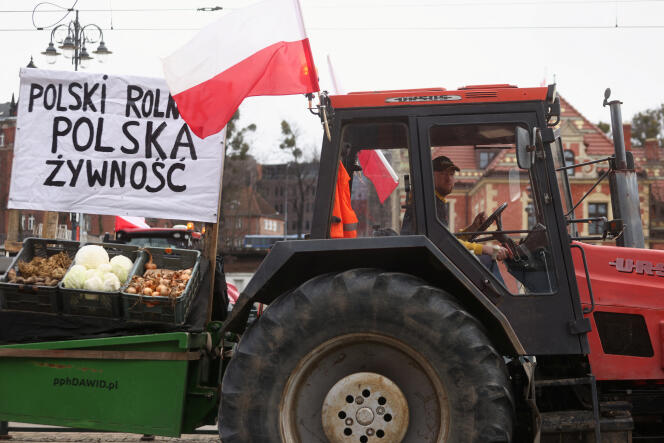


More than 200 blockade points across the country, long lines of tractors paralyzing freeways, crossroads, town centers and border crossings: A new day of mobilization by Polish farmers on Tuesday, February 20, broke participation records. The demands remain the same as since the beginning of the year but have become more radicalized. Protesters are now calling for a "complete embargo" on Ukrainian agricultural and food products, as well as Poland's withdrawal from the European Green Deal.
They are denouncing the explosion in their production costs at a time when silos and warehouses are saturated and prices are at their lowest, and fear a "catastrophe" in the run-up to the next harvest.
At the Medyka border crossing in the south of the country, farmers took over the tracks and dumped several tons of Ukrainian grain from stationary railcars onto the ground. These actions were described as "illegal (...), shameful and infamous" by the Ukrainian ambassador to Warsaw, Vasyl Zvarych. In a further sign that relations between the two countries are strained, Ukrainian president Volodymyr Zelensky reacted by denouncing an "erosion of solidarity:" "The situation at the Polish border cannot be considered normal. There is a clear need for justice. Only 5% of our agricultural exports pass through the Polish border. In reality, the situation is not about grain, it's a political matter."
Polish development minister Krzysztof Hetman, a member of the Polish People's party (PSL, with a traditional support base of farmers and peasants), said he supported the demonstrators' "just cause." "Taking into account that we have been supporting Ukraine since day one, I would be careful in expressing such opinions, as this is not about politics. I would advise our Ukrainian friends to be a little more sensitive to the problems of Polish farmers." The minister did not rule out lobbying within the ruling coalition for an extension of the embargo if a solution was not found at the European level.
In an interview with the Ukrainian edition of Forbes magazine, Ukrainian agriculture minister Mykola Solskyi threatened to impose an embargo on Polish food imports in retaliation.
Tensions between Kyiv and Warsaw escalated in September 2023, when the European Commission did not extend the embargo on Ukrainian grain for Poland, Slovakia, Hungary, Romania and Bulgaria. Poland, governed at the time by the national-populist Law and Justice party (PiS), decided to extend the embargo against the advice of Brussels, leading to a complaint by Kyiv to the World Trade Organization.
You have 50.61% of this article left to read. The rest is for subscribers only.
